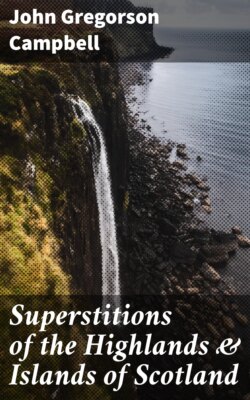Читать книгу Superstitions of the Highlands & Islands of Scotland - John Gregorson Campbell - Страница 24
На сайте Литреса книга снята с продажи.
FAIRY THEFT.
ОглавлениеTable of Contents
The elves have got a worse name for stealing than they deserve. So far as taking things without the knowledge or consent of the owners is concerned, the accusation is well-founded; they neither ask nor obtain leave, but there are important respects in which their depredations differ from the pilferings committed among men by jail-birds and other dishonest people.
The Fairies do not take their booty away bodily; they only take what is called in Gaelic its toradh, i.e. its substance, virtue, fruit, or benefit. The outward appearance is left, but the reality is gone. Thus, when a cow is elf-taken, it appears to its owner only as suddenly smitten by some strange disease (chaidh am beathach ud a ghonadh). In reality the cow is gone, and only its semblance remains, animated it may be by an Elf, who receives all the attentions paid to the sick cow, but gives nothing in return. The seeming cow lies on its side, and cannot be made to rise. It consumes the provender laid before it, but does not yield milk or grow fat. In some cases it gives plenty of milk, but milk that yields no butter. If taken up a hill, and rolled down the incline, it disappears altogether. If it dies, its flesh ought not to be eaten—it is not beef, but a stock of alder wood, an aged Elf, or some trashy substitute. Similarly when the toradh of land is taken, there remains the appearance of a crop, but a crop without benefit to man or beast—the ears are unfilled, the grain is without weight, the fodder without nourishment.
A still more important point of difference is, that the Fairies only take away what men deserve to lose. When mortals make a secret of (cleth), or grumble (ceasad) over, what they have, the Fairies get the benefit, and the owner is a poor man, in the midst of his abundance. When (to use an illustration the writer has more than once heard) a farmer speaks disparagingly of his crop, and, though it be heavy, tries to conceal his good fortune, the Fairies take away the benefit of his increase. The advantage goes away mysteriously ‘in pins and needles’ (na phrìneachan ’s na shnàdun), ‘in alum and madder’ (na alm ’s na mhadair), as the saying is, and the farmer gains nothing from his crop. Particularly articles of food, the possession of which men denied with oaths (air a thiomnadh), became Fairy property.
The elves are also blamed for lifting with them articles mislaid. These are generally restored as mysteriously and unaccountably as they were taken away. Thus, a woman blamed the elves for taking her thimble. It was placed beside her, and when looked for could not be found. Some time after she was sitting alone on the hillside and found the thimble in her lap. This confirmed her belief in its being the Fairies that took it away. In a like mysterious manner a person’s bonnet might be whipped off his head, or the pot for supper be lifted off the fire, and left by invisible hands on the middle of the floor.
The accusation of taking milk is unjust. It is brought against the elves only in books, and never in the popular creed. The Fairies take cows, sheep, goats, horses, and it may be the substance or benefit (toradh) of butter and cheese, but not milk.
Many devices were employed to thwart Fairy inroads. A burning ember (eibhleag) was put into ‘sowens’ (cabhruich), one of the weakest and most unsubstantial articles of human food and very liable to Fairy attack. It was left there till the dish was ready for boiling, i.e. about three days after. A sieve should not be allowed out of the house after dark, and no meal unless it be sprinkled with salt. Otherwise, the Fairies may, by means of them, take the substance out of the whole farm produce. For the same reason a hole should be put with the finger in the little cake (bonnach beag ’s toll ann), made with the remnant of the meal after a baking, and when given to children, as it usually is, a piece should be broken off it. A nail driven into a cow, killed by falling over a precipice, was supposed by the more superstitious to keep the elves away.
One of the most curious thefts ascribed to them was that of querns,11 or handmills (Bra, Brathuinn). To keep them away these handy and useful implements should be turned deiseal, i.e. with the right hand turn, as sunwise. What is curious in the belief is, that the handmill is said to have been originally got from the Fairies themselves. Its sounds have often been heard by the belated peasant, as it was being worked inside some grassy knoll, and songs, sung by the Fairy women employed at it, have been learned.
